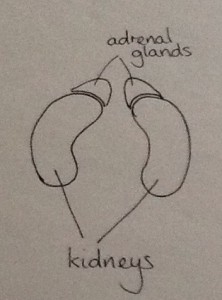Does chronic stress make us ill?
Yes. Chronic stress, stress that doesn’t let up, lowers the immune system and makes us ill. And that is really important at the moment because we are being fed stress and fear everyday. The government has behavioural psychologists amongst their advisors whose job it is to identify how to keep us fearful. How to make sure that we comply with the rules.
In a nutshell
Chronic stress makes us more vulnerable to lifestyle diseases. The things I focus on to reduce insulin resistance: Diet, Exercise, Sleep and Toxins are all worsened as a result of stress.
The Effects of Stress
We’ve known about the effects of stress for nearly 100 years. The flight or fight response was first described in the 1930’s by two American doctors Walter B Cannon and Hans Selye.
The flight or fight response is triggered very quickly by a hormonal response to perceived danger. Essentially, when we find ourselves in a dangerous situation our body instantly prepares to fight the danger or run away from it.
Stress Hormones
Stress hormones are chemical messengers secreted by glands in our body and include powerful stimulants. These stimulants: adrenaline, noradrenaline, cortisol, testosterone and thyroxine produce a variety of physical responses. Responses which are great in the short term for dealing with acute stress but don’t do us a lot of good when faced with chronic stress.
General Adaptation Syndrome
How the body adapts to long term stress was described by Dr Hans Selye in terms of the General Adaptation Syndrome. Hans Selye was one of two American doctors in the 1930’s who first described the stress response. His General Adaptive Syndrome divides the stress response into three stages: the alarm response, adaptation and exhaustion.
Alarm and Adaptation
The alarm response is the initial flight or fight response where hormones flood our system. Followed on by the adaptation phase which results from exposure from prolonged periods of stress. This is not necessarily a problem but periods of rest are required to counterbalance the stress. Failure to rest and relax leads to fatigue, lapses in concentration, irritability and tiredness.
Exhaustion
Exhaustion is where the adrenal glands start to become depleted and we start to experience mental, physical and emotional wipe out.
Signs that you may have reached exhaustion
Physical signs
- difficulty sleeping
- fatigue
- digestive discomfort
- loss of sex drive
- headaches
- general aches and pains
- infections
- tingling of hands and feet
- breathlessness
Mental signs
- lack of concentration
- memory lapses
- trouble making decisions
- confusion
- disorientation
- panic attacks
Behavioural signs
- appetite changes – eating too much or too little
- increased intake of alcohol or other drugs
- restlessness and anxiety
- hypochondria
Emotional signs
- depression
- impatience and irritability
- outbursts of anger
- tearfulness
- neglect of personal hygiene and appearance.
How Exhaustion Affects the Immune System
We started with understanding that chronic stress leads to poor diet, sleep, lack of exercise and increased drug use. Let’s finish by looking at the effect on immunity,
We know that immune system protects the body from infection. Let’s go a little further.
Excessive stress affects the thymus gland which manufactures white blood cells called T-cells. That T-cell immunity which we have heard so much about over the past year. Hormones produced by the stress response degrade the activity of these blood cells and cause damage to the body’s ability to fight infection. This leaves us prone, not just to Covid-19 but to the common cold, flu.
Adrenal fatigue makes asthma and other respiratory problems more likely. We become more susceptible to digestion related problems like Crones. Skin complaints like acne, spots, psoriasis. Headaches and migraines. The list goes on.
If you have made your way through to this point – thank you – have a look at my 10 tips to combat stress before you go and have a relaxing, peaceful day.




